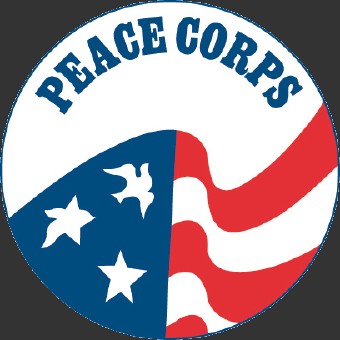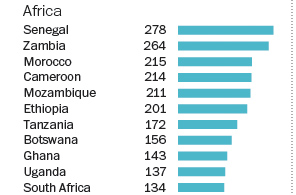
About Us
Mission / Fiscal
Board
of Directors
Kantuta Fund
Join Amigos
Related
50th Anniv
News
Newsletter
Other
Photo Album
Links
AMIGOS DE BOLIVIA Y PERÚ
7327 University Avenue,
Glen Echo, MD. 20812
(301)
320-5068
boliviayperu@hotmail.com
In 1961, President John F. Kennedy established the Peace Corps to promote world peace and friendship. Three simple goals comprise the Peace Corps mission:
- Helping the people of interested countries in meeting their need for trained men and women.
- Helping promote a better understanding of Americans on the part of the peoples served.
- Helping promote a better understanding of other peoples on the part of all Americans.
Click on the Peace Corps logo for more information on how to join.
Peace Corps announces major changes to application process By T. Rees Shapiro The Peace Corps, formed more than 50 years ago to send Americans abroad to perform good works, is in the midst of its most serious challenge, with the number of applicants falling rapidly, leaving the volunteer force at its lowest level in more than a decade. Recognizing that the organization envisioned by President John F. Kennedy could be endangered, its leaders are scheduled to announce Tuesday a series of steps to make it more attractive, including allowing candidates to choose the country where they want to serve, shortening the year-long application period, and recruiting more minorities and young people. "The Peace Corps is a great brand, but we really needed to bring it into the 21st century," Carrie Hessler-Radelet, director of the organization, said ahead of the announcement. "This is the most extensive reform effort our agency has ever undertaken." The federal agency, which has a $379 million annual budget and sends thousands of volunteers to more than 65 countries to conduct two-year service projects, has at times tangled its applicants in red tape. In interviews, Peace Corps alumni described waiting on average more than a year before being accepted. Some had come to calling the anxiety they felt "restless applicant syndrome." Under the new guidelines, the steps could be completed in six months.
Serving in the Peace Corps The Peace Corps will hope to avoid leaving potential volunteers in limbo, part of a package of changes that officials think will make the organization more appealing to the nation's under-30 crowd. Jessie Beck, 26, who taught English in Madagascar from 2011 to 2013, said she was hesitant to make any personal or professional commitments while waiting to hear back from the Peace Corps. "I didn't want to get a full-time job, didn't want to get involved with a serious boyfriend and didn't even want to sign a year-long lease. I wanted to be ready to go," she said. "There are definitely people that drop out during the process because a lot can happen in a year that can change your mind about going abroad." In the past nine months, more than 30,000 potential candidates did not complete their applications, according to the Peace Corps. The number of candidates who have finished them has dropped from a peak of 15,384 in fiscal 2009 to 10,118 in fiscal 2013, a decline of 34 percent. The agency's recruiting suffered setbacks after several volunteers came forward with harrowing accounts of sexual assaults in their host countries. Hessler-Radelet said she hopes the improvements will encourage more people to apply and boost the agency's number of volunteers, especially among minorities. Of the 7,200 volunteers currently deployed, whites make up 76 percent; blacks, 6 percent; Hispanics, 9 percent; and Asians, 5 percent.
|

